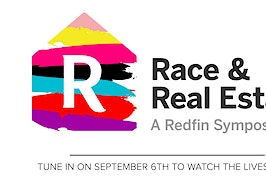Glenn Kelman, Redfin’s CEO and president took the helm of the then-fledgling real estate brokerage 13 years ago, this month. In those years, the company has seen tremendous growth, launched new products and even went public.

Glenn Kelman
Kelman has gained a reputation in the industry of being a vocal executive for the Seattle-based company, taking stances on hot-button issues like Seattle’s corporate head-tax, the Trump administration’s policy of separating children at the border and most recently, how the real estate industry perpetuates discrimination.
In a wide-ranging interview, Kelman spoke with Inman about Redfin’s growth, how he softened from his early career brashness, his jealously over the Zillow Zestimate and why he’s torn over speaking out about politics.
As you look back at 13 years with Redfin, how do you feel the company has grown under your leadership and are you happy with that progress?
I’m so proud of Redfin. I love this company. I love it more now than I ever have, and that’s the truth.
The thing that I’m proud of is our core service of helping people buy and sell homes. Your children can grow up differently than you imagine and in this case, Redfin is better than I imagined. That doesn’t mean that there still aren’t aspects of the company that drive me crazy, examples of services where we could have done much better. I still believe that Redfin five years from now is still going to be so much better than it is now. There are so many ways we have to grow. But I also feel grateful for all the people here who have solved so many problems that seemed insurmountable in the past. I still feel hungry, I still feel crazy about all those problems we have yet to solve.
What are the things you regret with regards to how you or the company handled it, or a product rollout you would have done differently?
Oh my gosh, well there’s so many of those. How about the Scouting Report? We rated every agent in the Multiple Listing Service (MLS) publishing their sales and when we did that – first of all, we just forgot that we’re competing with these people so we can’t possibly be viewed as an objective provider of information. And second, we had some terrible bugs where we double counted sales because people belonged to two MLSs or we missed sales because we didn’t have data from another MLS. It was such a disaster.
I think the thing I regret the most though, is just that I was so pugnacious in the early days. I felt very insecure about our place in real estate. There were all sorts of people who challenged Redfin and I don’t think I handled it well. I wish I had been more collegial, more diplomatic.
The turning point in that is when I went to lunch with [Matt and Joe Deasy of Windermere Real Estate] in Seattle, they run a competing brokerage. And they just said, “we’re trying to help people too. We take pride in our service too. And being vilified as members of some evil industry is so far from who we really are. We just want to be treated like human beings and we want to treat you that way.”
And I just felt, I could imagine them, every time I talked about a traditional real estate agent or a competing brokerage, instead of it being a faceless competitor I imagined those two people who are brilliant and principled. And that’s when I began to feel like I could take my place in the industry. I think for a long time I had been just a little crotchety, a little brash and out of line.

Redfin billboard. Credit: Brad Inman
What are some growth prediction for Redfin? [Note: Redfin is a publicly traded company, so Kelman declined to make specific forward-thinking statements but spoke generally]
What was hard about Redfin in the first 13 years was getting a foothold in most markets. We couldn’t cover the territory because we didn’t have enough agents to get across Houston or Los Angeles or Seattle even. Nobody knew us and it’s a very risk-averse consumer. It was hard to win people’s trust. We didn’t have any listings so we didn’t have any real standing about how data should be shared or homes should be sold.
If someone were to come today and say, “I want to cold start a brokerage,” I would say, “Well let me sit down with you and explain how long that’s going to take. It’s going to be one of the hardest things you’ve ever done, it might be the best thing you’ve ever done because certainly, that’s how I feel about it. It’s not for the faint of heart. And I hope you’re a young person because it’s going to take you a long time.”
So I think having gotten that foothold in those markets and figuring out the right kind of service to deliver to our customers, I’m so much more optimistic about our future, whereas five years ago I wasn’t sure we had the right trade-off between service and price. I wasn’t sure we had enough agents to really be local, to know the neighborhoods, to get people into homes fast. And I didn’t feel we had the customer base to grow organically. We had a website helping us meet customers but we didn’t have enough repeat and referral business because we hadn’t met enough people yet. And now I think those factors that were working against us, at least in some markets, are starting to work for us.
So I’m optimistic about growth. I think the law of large numbers is always imposing. It’s harder to double a large business that’s got hundreds of millions in revenue. But I think it’s also hard to start out a brokerage where you have one real estate agent and you’re promising to save the world.

Redfin takes center stage in Times Square
Why invest further into Redfin Now, the company’s iBuyer program? Do you see this as the future?
We were cautious about it. If your goal is to list a significant portion of homes in America, it might not be the most prudent course to actually have to buy a significant percentage of American homes. So we’re aware of the capital risk, but what we’re most confident about is that many homeowners will want the choice. So I don’t know how many people are going to take that offer because the competitiveness of that offer is going to go up and down with cost of capital. When it gets expensive to borrow money and it gets hard to sell a house – you’re three, four months on the market before you can turn that capital over – the offer won’t account for that, it will be lower.
I think the market is going to fluctuate for the iBuyer type program. We try to be very clear about that. We do think that consumers are going to want that choice. If someone asked you, “look I want to sell your house, but first, would you like to see the check that’s in the envelope?” How likely are you to say, “no I don’t need to see that check, let’s just list the house.” For us to be effective at selling people’s houses, we have to be effective at giving them choices.
What are your biggest hindrances to growth?
Redfin has had a real shared sense of purpose. There’s been a culture that’s had some level of intimacy and I’ve loved that. I view myself not as an industrial titan, as a startup guy, an entrepreneur, and I think other people feel that way too. And as we grow, the thing I worry about losing the most is our moral compass. You can taste pressure from Wall Street that makes you do the wrong thing. If we ever do that, I wouldn’t want to work here. Losing that sense of cultural cohesion or intimacy – the real reason I come to work, I really care about making real estate better in the United States. I really believe in that mission. But the real immediate reason I come to work is five feet away from me on my left and on my right – the people around me and how we come together to solve a problem instead of bickering and blaming each other. I’ve been in other corporate environments and I really like this one.

Redfin’s deal room dashboard
What is one trend in the industry that you’re sick of or wish would go away?
Too much money. There’s so much private capital floating into the business. It’s a little rich for me to complain about it because we’ve been the beneficiary and now we’re trying to make sure nobody else gets it. But I think capital to build a competitive advantage, to build technology, to invest in a customer experience is inarguable. Capital for capital’s sake, when your competitive advantage is just your bankroll, that’s become a new way to win and I hate it.
At the end of the day, we still have this saying, that we’re paid by the sweat of a person’s brow by someone who’s coordinating a sale, or hosting a home tour. Which is cheap and sometimes fortune favors the bold – the one who is willing to spend more, to bend more, to take more risk and I think you just have to be careful with that. It’s one thing to spend investors money but at the end of the day, you’re spending your customer’s money and they worked really hard to build that equity in their home. And we’re working really hard to let them keep more of it. I worry about the amount of money sloshing around and I worry about whether that makes our industry as financially disciplined as it should.
I have to ask: are you referencing Compass?
No, I’m not referencing one particular company, I really am not. There are so many businesses right now that are just getting tons and tons of dough at the Series A stage, a seed stage, it just used to be, Redfin was seeded with, I think, a few hundred thousand dollars and we have to live on that for a long time. Now the new seed amount is probably $10 million dollars. I think it’s at every stage, but I know why you asked the question.
What’s one trend you like?
I like it that all of the innovation right now is happening in the brokerage space. For such a long time, all of the innovation was happening among media companies. We were trying to outdo ourselves with how we put listings on the web, which isn’t the only problem in real estate. It’s not the hardest problem to solve. It isn’t the one that consumers care the most about. What they care about is getting good service and good value. And I just love it that brokerages are getting funded. And that the innovation is happening at that level because that’s what’s really gonna make the industry better for consumers. And I love it too that some of the people starting these businesses come from the traditional industry. You look at Telora for example. That’s run by somebody who I think was a top producer at Re/Max and his execution in Denver has been amazing. [Note, Trelora CEO Joshua Hunt started his career at RE/Max, before becoming a top producer with Keller Williams].
What’s one innovation in the industry you wish you would have thought of, or that Redfin was the first to?
I really think it made a difference for Zillow to have invented the Zestimate. And it’s not as if we hadn’t considered it. We did. And we worried that it was irresponsible. And I don’t think we properly accounted for the idea that – even if it’s not perfect, people want a basic sense of what their home is worth without having to talk to anyone. And of course now we have an estimate and think it’s the most accurate but that would be an example where I think Zillow’s boldness paid off.

How involved do you believe the real estate industry should be in political issues that don’t inherently seem related to housing?
I do ask myself, ‘What right do I have to espouse my personal political opinions standing on a platform built by people who voted for Hillary [Clinton] and who voted for Donald Trump, liberals and conservatives.’ I don’t want to be self-indulgent about it and at the same time, I worry that history will judge all of us, the people running businesses that didn’t stand up for what we believe in. So half the time I feel like a self-indulgent windbag and half the time I feel like a coward.
People who are moving, that is a real estate issue, housing and affordability is a real estate issue. Providing the same level of service to white people and black who are trying to buy a home is a real estate issue. And I on all of those issues, I just think that there is a place for us to stand up. And where I think we just may want to pay attention: there was a broad consensus a decade ago that we had to invest in housing every generation. That we had to build the houses and issue the permits and create the roads and invest in the schools so that a new generation of young people had somewhere to go. And that has really disappeared.
I feel mixed about the deduction for mortgage interest because it is somewhat regressive, but I don’t feel mixed about advocating in the most full-throated way to make sure that we build houses for the next generation and I think that our silence, our complicity in zoning laws that limit density and wringing our hands about whether or not we just really need to embrace growth in every American city – and San Francisco feels mixed about that, Seattle feels mixed about that, Portland feels mixed about that – and we end up putting our heads in the sand and letting home prices shoot through the roof. And that’s why our kids are going to be living in our basements.
Is there a social issue you think the real estate community should be working to address?
We just want to make sure we treat everyone fairly. Real estate is mostly a sales job and often sales jobs attract people from the majority so the industry is very white. And I’m not going to apologize for being white, I don’t want anyone else to apologize for being white, but we should just make sure that a black person trying to move into a white neighborhood feels like we’re on their side and take that obligation seriously.
I know I spoke about this at [Inman Connect San Francisco] but this isn’t just a table at a restaurant it isn’t just a seat on an airplane. It is where you’re going to put your kids in school, it’s where you’re going to live, it’s who your peers are going to be, it really affects the whole trajectory of your life. We’re all trying to make a living too, I understand that, but I think we’ll all look back on ourselves and be proud if we’re really proactive about making sure that everybody has access to the American Dream: military veterans, white people, Black people, Asian Americans and all the rest. That’s the issue that the industry is really starting to focus on and I’m proud we are.














